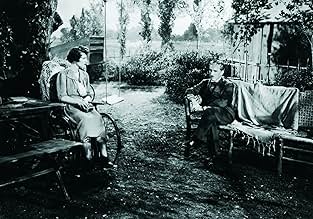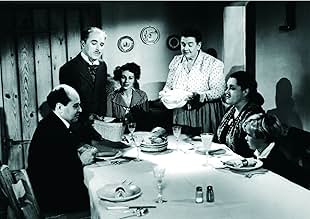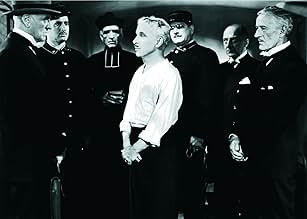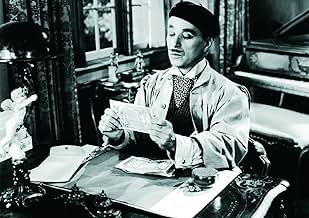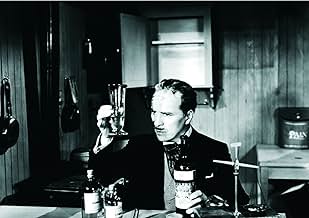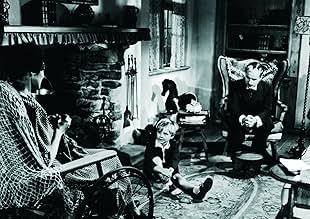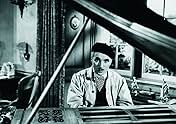CALIFICACIÓN DE IMDb
7.8/10
20 k
TU CALIFICACIÓN
Un hombre afable pero egoísta se casa por dinero con mujeres ricas y las mata para mantener su familia, pero ese trabajo conlleva algunos riesgos ocupacionales.Un hombre afable pero egoísta se casa por dinero con mujeres ricas y las mata para mantener su familia, pero ese trabajo conlleva algunos riesgos ocupacionales.Un hombre afable pero egoísta se casa por dinero con mujeres ricas y las mata para mantener su familia, pero ese trabajo conlleva algunos riesgos ocupacionales.
- Dirección
- Guionistas
- Elenco
- Nominado a 1 premio Óscar
- 6 premios ganados y 1 nominación en total
Ada May
- Annette - Her Maid
- (as Ada-May)
Bernard Nedell
- Prefect of Police
- (as Bernard J. Nedell)
- Dirección
- Guionistas
- Todo el elenco y el equipo
- Producción, taquilla y más en IMDbPro
Opiniones destacadas
The word "Bluebeard" ("Landru" in French) has been a part of the American vernacular for some time now, synonymous with the term "wife-killer." Several variations of the infamous Parisian charmer who married then buried have been filmed over the decades - some OK, others not. John Carradine starred in a respectable but unheralded version in the mid-30s as a puppeteer-turned-perpetual strangler. A so-so French/Italian co-production in 1962 starring Charles Denner and Michele Morgan strove for dark comedy but ultimately lacked the creative spark. The worst of the lot was a wretched Richard Burton/Raquel Welch/Joey Heatherton rehash in the 70s, the nadir of Burton's screen career.
It seems most fitting then that the wry, comic genius of Charlie Chaplin, our beloved "Little Tramp," is allowed to put its delightfully macabre spin on the Bluebeard tale with 1947's "Monsieur Verdoux," winding up with perhaps the most entertaining version yet. First and foremost, it is a pleasure to hear Charlie talk. I also venture to say this is the best of his sound-era films, well-mounted and shot meticulously in black and white, in which he not only produced and directed but provided the music. Who but the loveable Chaplin, with that ever-present tinge of pathos, could play the role of a methodical, unrepentant human wife-disposal who kills purely for financial reward, and have the audience rooting for him!
Our titular hero is a charming fop of a fellow who operates his deadly deception by a precise timetable - he fastidiously charms, marries and eliminates his unsuspecting victims with keen attention paid to banker's hours! But it's Monsieur Verdoux's motive that gains the viewer's empathy. Our boy is not the mad, demented, twisted, cold-hearted monster one must think. He carries out his dastardly deeds out of selfless need. His out-of-town "business" is conducted solely in order to support and tend to his wheelchair-bound wife, a hopeless cripple and invalid, and family. His devotion, in fact, is so honorable, he succeeds in wrapping you around his little wedding finger. As much as you sympathize for the dowagers he does in, you can't help but think at least the old dears died having been graced by such a noble gentleman.
Brash loudster Martha Raye, often considered a bust in films for being intolerably larger-than-life, has one of her best roles here, grabbing her share of laughs as one of Verdoux's intended victims - a shrill, obnoxious, but verrrry wealthy dame whom nobody would really mind seeing knocked off. The problem is Charlie can't seem to off her! Every industrious attempt fails miserably. In one truly madcap scene that directly parodies Theodore Dreiser's classic novel "An American Tragedy," Charlie takes Martha, outlandishly bedecked in silver fox furs, out on a crude fishing boat excursion in the hopes of drowning the tenacious harridan. Two comic masters in vintage form.
Of course, Charlie does get his comeuppance but its all done in grand, sophisticated style. The whole movie is, in fact, so precise and polished that one must forgive him, given his controversial "subversive" leanings at the time, for tacking on an interminable, out-of-character piece of political diatribe at the finishing line. The movie's theme and bitter irony did not even pretend to disguise his great personal anguish and bitterness at America when political conservatives were breathing down his neck. Forgiven he is, for this black comedy, a sublime, eloquent retread of an old familiar creeper, comes off refreshingly original.
It seems most fitting then that the wry, comic genius of Charlie Chaplin, our beloved "Little Tramp," is allowed to put its delightfully macabre spin on the Bluebeard tale with 1947's "Monsieur Verdoux," winding up with perhaps the most entertaining version yet. First and foremost, it is a pleasure to hear Charlie talk. I also venture to say this is the best of his sound-era films, well-mounted and shot meticulously in black and white, in which he not only produced and directed but provided the music. Who but the loveable Chaplin, with that ever-present tinge of pathos, could play the role of a methodical, unrepentant human wife-disposal who kills purely for financial reward, and have the audience rooting for him!
Our titular hero is a charming fop of a fellow who operates his deadly deception by a precise timetable - he fastidiously charms, marries and eliminates his unsuspecting victims with keen attention paid to banker's hours! But it's Monsieur Verdoux's motive that gains the viewer's empathy. Our boy is not the mad, demented, twisted, cold-hearted monster one must think. He carries out his dastardly deeds out of selfless need. His out-of-town "business" is conducted solely in order to support and tend to his wheelchair-bound wife, a hopeless cripple and invalid, and family. His devotion, in fact, is so honorable, he succeeds in wrapping you around his little wedding finger. As much as you sympathize for the dowagers he does in, you can't help but think at least the old dears died having been graced by such a noble gentleman.
Brash loudster Martha Raye, often considered a bust in films for being intolerably larger-than-life, has one of her best roles here, grabbing her share of laughs as one of Verdoux's intended victims - a shrill, obnoxious, but verrrry wealthy dame whom nobody would really mind seeing knocked off. The problem is Charlie can't seem to off her! Every industrious attempt fails miserably. In one truly madcap scene that directly parodies Theodore Dreiser's classic novel "An American Tragedy," Charlie takes Martha, outlandishly bedecked in silver fox furs, out on a crude fishing boat excursion in the hopes of drowning the tenacious harridan. Two comic masters in vintage form.
Of course, Charlie does get his comeuppance but its all done in grand, sophisticated style. The whole movie is, in fact, so precise and polished that one must forgive him, given his controversial "subversive" leanings at the time, for tacking on an interminable, out-of-character piece of political diatribe at the finishing line. The movie's theme and bitter irony did not even pretend to disguise his great personal anguish and bitterness at America when political conservatives were breathing down his neck. Forgiven he is, for this black comedy, a sublime, eloquent retread of an old familiar creeper, comes off refreshingly original.
A suave but cynical man (Charles Chaplin) supports his family by marrying and murdering rich women for their money, but the job has some occupational hazards.
This film is brilliant, because it is not just entertaining, but also has a strong message. On the surface, it is a man who marries women and kills them in order to get their money. This in itself makes for a good film (and is somewhat risqué for the 1940s). But then, it is also a metaphor for society -- capitalism, imperialism, war... Chaplin takes on the Great Depression and the war industry.
Most people know Chaplin for his silent films and tramp character, but he really became a strong filmmaker in his later years. This film, along with "Great Dictator" and "King in New York" are among his best works. It is a shame that for whatever reason he is not remembered for the second half of his career.
This film is brilliant, because it is not just entertaining, but also has a strong message. On the surface, it is a man who marries women and kills them in order to get their money. This in itself makes for a good film (and is somewhat risqué for the 1940s). But then, it is also a metaphor for society -- capitalism, imperialism, war... Chaplin takes on the Great Depression and the war industry.
Most people know Chaplin for his silent films and tramp character, but he really became a strong filmmaker in his later years. This film, along with "Great Dictator" and "King in New York" are among his best works. It is a shame that for whatever reason he is not remembered for the second half of his career.
As Charlie Chaplin put it when the tramp finally talked in The Great Dictator the magic was gone. Chaplin felt he had to come up with another character in order to continue his career and he got away from the lovable Little Tramp as far as he could with Monsieur Verdoux.
A whole lot of people were shocked when Monsieur Verdoux came out and instead of the Tramp we got a Bluebeard murderer. Black comedy was not a genre popular in the USA at that time and a lot of people hated this film. None more so than Hollywood columnist Hedda Hopper who as a good conservative Republican cheered on the coming blacklist and beat the drums for Chaplin's deportation. No accident that Chaplin was hauled before the House Un-American Activities Committee at the time Monsieur Verdoux came out.
Based on the famous French mass criminal Henry Desire Landru, Monsieur Verdoux tells the story of a bank clerk who lost his job and to support his family started marrying and murdering rich women. Verdoux keeps quite a schedule because he's marrying several of them at the same time. But always returns to wife Mady Correll and son Allison Roddan.
Funniest marriage is to Martha Raye who not only is he unsuccessful in killing, she nearly does him in on a couple of occasions strictly by accident. That raucous laugh might elicit sympathy from a jury if anyone ever heard it and was condemned to live with it even part time.
With the marriage to Raye comes the film's funniest sequence Chaplin trying to kill Raye when they were in a boat on a lake in Switzerland. It will not escape your attention that the sequence is borrowed from Theodore Dreiser's An American Tragedy which was already filmed in 1931 and would shortly be filmed again in 1951 as A Place In The Sun. Ironic indeed how the same plot gambits can be played for laughs or deadly serious.
Second funniest is Raye showing up at Chaplin's wedding to Isobel Elsom whom he has targeted. It forces him to leave her at the altar not knowing at that time how lucky she was.
Truth be told some of Chaplin's left wing political views are grafted into the film somewhat forcibly. It's what got Hedda Hopper's undergarments in such a twist. Still this an amusing film and not fairly judged by a lot of people at the time it came out.
A whole lot of people were shocked when Monsieur Verdoux came out and instead of the Tramp we got a Bluebeard murderer. Black comedy was not a genre popular in the USA at that time and a lot of people hated this film. None more so than Hollywood columnist Hedda Hopper who as a good conservative Republican cheered on the coming blacklist and beat the drums for Chaplin's deportation. No accident that Chaplin was hauled before the House Un-American Activities Committee at the time Monsieur Verdoux came out.
Based on the famous French mass criminal Henry Desire Landru, Monsieur Verdoux tells the story of a bank clerk who lost his job and to support his family started marrying and murdering rich women. Verdoux keeps quite a schedule because he's marrying several of them at the same time. But always returns to wife Mady Correll and son Allison Roddan.
Funniest marriage is to Martha Raye who not only is he unsuccessful in killing, she nearly does him in on a couple of occasions strictly by accident. That raucous laugh might elicit sympathy from a jury if anyone ever heard it and was condemned to live with it even part time.
With the marriage to Raye comes the film's funniest sequence Chaplin trying to kill Raye when they were in a boat on a lake in Switzerland. It will not escape your attention that the sequence is borrowed from Theodore Dreiser's An American Tragedy which was already filmed in 1931 and would shortly be filmed again in 1951 as A Place In The Sun. Ironic indeed how the same plot gambits can be played for laughs or deadly serious.
Second funniest is Raye showing up at Chaplin's wedding to Isobel Elsom whom he has targeted. It forces him to leave her at the altar not knowing at that time how lucky she was.
Truth be told some of Chaplin's left wing political views are grafted into the film somewhat forcibly. It's what got Hedda Hopper's undergarments in such a twist. Still this an amusing film and not fairly judged by a lot of people at the time it came out.
In his autobiography Charles Chaplin called this film his "cleverest and most brilliant" comedy, yet very few people at the time the movie was released shared this view. It was the first Chaplin US failure both with critics and audiences (though in Europe the film did quite well).
Here Chaplin plays Henri Verdoux, a serial killer who makes his living by marrying and murdering lonely reach women. Chaplin softened his character by making him a lifelong bank clerk who was laid off at the age when it was already too late to start life anew, meanwhile he has a family to support (a small son and an invalid wife). He's caught and put to trial where he accuses a hypocritical society of sanctioned mass murders and describes himself as an amateur in the field. Originally the idea belonged to Orson Welles who wanted to make a movie based on the story of a notorious murderer Henri Landru, a Frenchman who was executed in 1922 for murdering 8 women. Welles asked Chaplin to star in his film but the latter refused as he thought it was too late for him to play in a movie directed by someone else. But he bought the original idea from Welles and made what could have been a detective story or a thriller into a black comedy. It was certainly provocative and its sarcastic and ironic gravity was astonishing for the time. There is a scene, for instance, when Verdoux while waiting for the execution, talks to a journalist and pronounces the words that still fill me with horror (as they are as true nowadays as they had been fifty years ago):"Wars, conflicts - it's all business. One murder makes a villain; millions a hero. Numbers sanctify." Yet "Monsieur Verdoux" which is generally known as the most pessimistic of Chaplin films is not devoided of humour. On the contrary, at some moments it's extraordinary funny: take for instance the famous scenes with his "wives" (Annabella or Lydia)or those with madam Grosnay (my favourite bit is when Verdoux is talking to her from a flower shop, the look at the flower girl's face is wonderful!). I believe the film is one of the best I've ever seen and I highly recommend it to everyone.
Here Chaplin plays Henri Verdoux, a serial killer who makes his living by marrying and murdering lonely reach women. Chaplin softened his character by making him a lifelong bank clerk who was laid off at the age when it was already too late to start life anew, meanwhile he has a family to support (a small son and an invalid wife). He's caught and put to trial where he accuses a hypocritical society of sanctioned mass murders and describes himself as an amateur in the field. Originally the idea belonged to Orson Welles who wanted to make a movie based on the story of a notorious murderer Henri Landru, a Frenchman who was executed in 1922 for murdering 8 women. Welles asked Chaplin to star in his film but the latter refused as he thought it was too late for him to play in a movie directed by someone else. But he bought the original idea from Welles and made what could have been a detective story or a thriller into a black comedy. It was certainly provocative and its sarcastic and ironic gravity was astonishing for the time. There is a scene, for instance, when Verdoux while waiting for the execution, talks to a journalist and pronounces the words that still fill me with horror (as they are as true nowadays as they had been fifty years ago):"Wars, conflicts - it's all business. One murder makes a villain; millions a hero. Numbers sanctify." Yet "Monsieur Verdoux" which is generally known as the most pessimistic of Chaplin films is not devoided of humour. On the contrary, at some moments it's extraordinary funny: take for instance the famous scenes with his "wives" (Annabella or Lydia)or those with madam Grosnay (my favourite bit is when Verdoux is talking to her from a flower shop, the look at the flower girl's face is wonderful!). I believe the film is one of the best I've ever seen and I highly recommend it to everyone.
Charlie Chaplin is "Monsieur Verdoux" in this 1947 film based on the real-life serial killer Henri Landru. Verdoux is a bank clerk who is laid off late in life and turns to marrying and killing women for their money in order to support his invalid wife and child. Sounds brutal, and when you think about it, it really is, but Chaplin as usual manages to couch his message in comedy. While we see that he is successful in knocking off a couple of women and getting their money (though we never actually see a murder), Verdoux has a couple of failures as well, and there the fun begins. One of his women, Annabella Bonheur, is played hysterically by Martha Raye as a vulgar loudmouth eternally suspicious of Verdoux, who is posing as a boat captain. He tries some different ways of killing her, but no matter what he does, nothing works. He then turns his attention to another woman he's been chasing for some time, Marie Grosnay (Isobel Elsom). He's about to walk down the aisle when who does he see as a guest at the wedding - Annabelle. His attempts to get out of the house are priceless.
Despite some genuinely comical scenes, the speech that Verdoux makes gives its deeper message - Verdoux was in it for the money. To him, the women were business propositions to be exploited. His point is that what he has done on a smaller scale is being done by dictators worldwide; people are not treated as human beings but merely for economic gain, for power and for exploitation. Though Verdoux's argument doesn't absolve him of responsibility or justify his actions, the warning is a good one - people need to care more about each other and about what's going on in their world, and put their attention on really important matters like suppression of the masses. Why, he asks, are the headlines full of Verdoux and not of what is going on around the world? (The film's ending takes place in 1937.) It's interesting to consider what would have happened to this story in the hands of Orson Welles, whose idea it was originally. He wouldn't have made it a comedy. It would have been a drama or a detective story. Only Chaplin would think of making the story of a serial killer into a comedy of sorts. Certainly 1967's "No Way to Treat a Lady" takes a page or so from this script.
"Monsieur Verdoux" wasn't well received by the public - at all - and by 1947, people were questioning Chaplin's politics instead of reveling in his genius. It possibly was ahead of its time; it certainly wasn't appreciated as it is today. The movie is not without some problems, the biggest one being, what the heck happened to Verdoux's wife and child? It is never explained.
"Wars, conflicts - it's all business. One murder makes a villain; millions a hero. Numbers sanctify." Charlie Chaplin as Verdoux said that 61 years ago.
Despite some genuinely comical scenes, the speech that Verdoux makes gives its deeper message - Verdoux was in it for the money. To him, the women were business propositions to be exploited. His point is that what he has done on a smaller scale is being done by dictators worldwide; people are not treated as human beings but merely for economic gain, for power and for exploitation. Though Verdoux's argument doesn't absolve him of responsibility or justify his actions, the warning is a good one - people need to care more about each other and about what's going on in their world, and put their attention on really important matters like suppression of the masses. Why, he asks, are the headlines full of Verdoux and not of what is going on around the world? (The film's ending takes place in 1937.) It's interesting to consider what would have happened to this story in the hands of Orson Welles, whose idea it was originally. He wouldn't have made it a comedy. It would have been a drama or a detective story. Only Chaplin would think of making the story of a serial killer into a comedy of sorts. Certainly 1967's "No Way to Treat a Lady" takes a page or so from this script.
"Monsieur Verdoux" wasn't well received by the public - at all - and by 1947, people were questioning Chaplin's politics instead of reveling in his genius. It possibly was ahead of its time; it certainly wasn't appreciated as it is today. The movie is not without some problems, the biggest one being, what the heck happened to Verdoux's wife and child? It is never explained.
"Wars, conflicts - it's all business. One murder makes a villain; millions a hero. Numbers sanctify." Charlie Chaplin as Verdoux said that 61 years ago.
¿Sabías que…?
- TriviaVerdoux's quote "One murder makes a villain; millions a hero" is taken from the abolitionist Bishop Beilby Porteus (1731-1808).
- ErroresWhen Monsieur Verdoux states the area of the house being sold he mentions the lengths in feet. As the film is set in France, he should have used meters.
- Citas
Henri Verdoux: Wars, conflict - it's all business. One murder makes a villain; millions, a hero. Numbers sanctify, my good fellow!
- Versiones alternativasThe West German theatrical version was cut by approximately 15 minutes.
- ConexionesFeatured in Amor ciego (2001)
Selecciones populares
Inicia sesión para calificar y agrega a la lista de videos para obtener recomendaciones personalizadas
- How long is Monsieur Verdoux?Con tecnología de Alexa
Detalles
- Fecha de lanzamiento
- País de origen
- Sitios oficiales
- Idiomas
- También se conoce como
- Monsieur Verdoux
- Locaciones de filmación
- Productora
- Ver más créditos de la compañía en IMDbPro
Taquilla
- Presupuesto
- USD 2,000,000 (estimado)
- Total en EE. UU. y Canadá
- USD 64,636
- Total a nivel mundial
- USD 65,718
- Tiempo de ejecución2 horas 4 minutos
- Color
- Relación de aspecto
- 1.37 : 1
Contribuir a esta página
Sugiere una edición o agrega el contenido que falta

Principales brechas de datos
By what name was Monsieur Verdoux, el moderno Barba Azul (1947) officially released in India in English?
Responda

